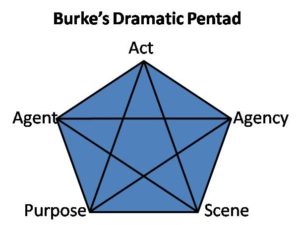Bourgonjon, Jeroen et al. “From Counter-Strike to Counter-Statement: Using Burke’s Pentad as a Tool for Analysing Video Games.” Digital Creativity 22.2 (2011): 91–102. Web.
In From Counter-Strike to Counter-Statement: Using Burke’s Pentad to Analyse Video Games, Jeroen Bourgonjon et. al. use rhetorical theory, and

Act-Age-Scene-Purpose-Intent
specifically Burke’s concept of the pentad as a methodological tool for the analysis of video games. Rhetorica.net describes the pentad as a series of questions, stating that “Burke believed that all of life was drama (in the sense of fiction), and we may discover the motives of actors (people) by looking for their particular type of motivation in action and discourse.” From the perspective of narratology, then, this provides a useful way of looking at the reasons behind the actions people take in video games. The authors also explain that utilizing the pentad can help the researcher to understand the game from multiple perspectives, including that of the designer (author) and the player (reader).
The authors also use what Ian Bogost terms procedural rhetoric, which they define as, “based on meaning making through the selective simulation of specific rules. Games do not as much persuade players by telling them things (games as representations), but rather by confronting them with the results of their actions through the game rules” (91). Published in 2011, this shows one of the ways the field has moved past narratology and ludology into a methodology that uses game mechanics, or rules, as a way of communicating meaning, which in turn is given context through the narrative being told by the game.

What is most fascinating about this article is the way in which it applies traditional English studies methodologies and theories as a way of analyzing games. The statements made by early game researchers that games were too important to be left to scholars of other disciplines is squarely put to rest by this, as the authors utilize traditional rhetorical theory, dramatic analysis theory first applied to literature, and Bogost’s procedural rhetoric notion, which was first explained in Persuasive Games: the Expressive Power of Video Games (MIT Press, 2007), which is considered seminal in modern video game scholarship. Procedural rhetoric, as applied to this situation, addresses gameplay as a form of procedure, that can then be applied for rhetorical purposes.
I also found their recap of other existing methodologies (all aligned with the ludology side of the force) for analyzing games especially helpful, as they reference Aarseth, with whom I was already familiar, but also works by Konzack, whose approach focused on the analysis of, “hardware; program code; functionality; gameplay; meaning; referentiality; and socio-cultural aspects,” (98), as well as Maillet who suggested that the analysis of a game may include more than just gameplay, such as walkthroughs, cut scenes, and forum postings, thereby expanding the scope of games as objects of study.

The authors utilize Burke’s pentad as a way of seeing “ratios,” or relations between different aspects of a game – in this case, Bioshock. In their conclusion, they show how this kind of analysis can be used in education, and to connect the analysis to curricular goals.
Ultimately, this article provides an analysis model that includes both rhetorical theory and traditional literary theory to analyze gameplay and storytelling, using the tools of multiple sub-fields within English studies to better understand one of the most popular games of the last decade.
Additional Readings:
Professor Andrew Cline’s site, Rhetorica.net, defines a number of useful concepts, including “Burke’s Pentad: Dramatism.”
Bioshock is the primary focus of the article, and this wiki entry covers the basics of the game.
Ian Bogost’s website, covering his books, games, and research.